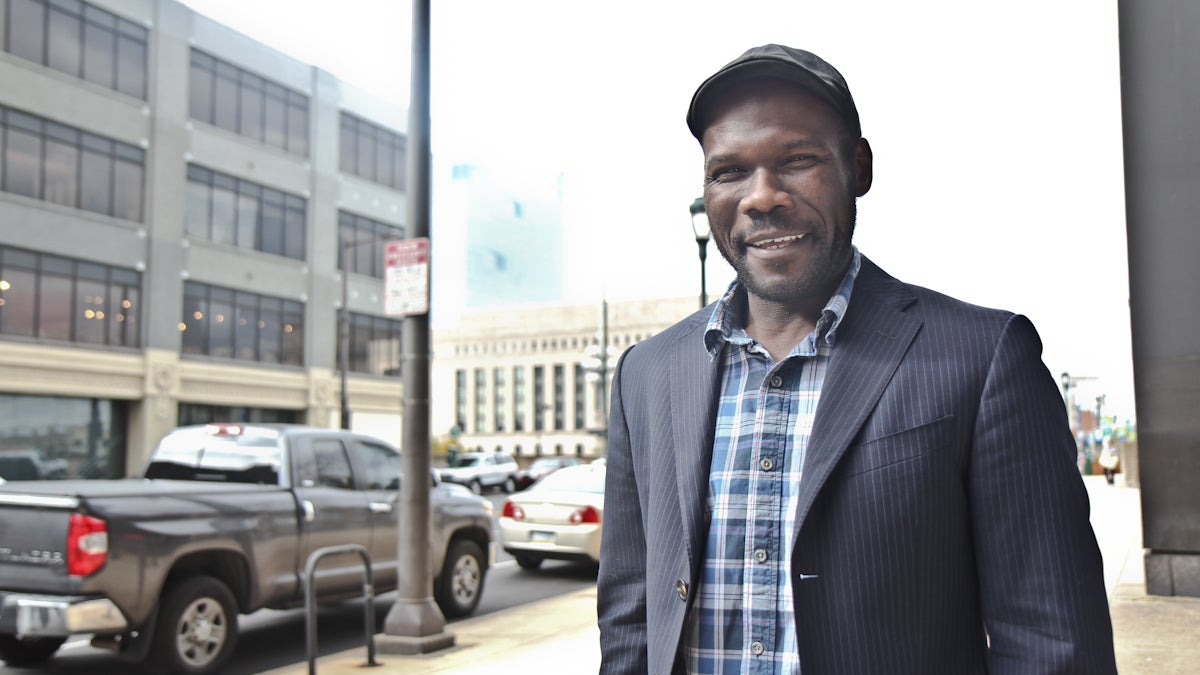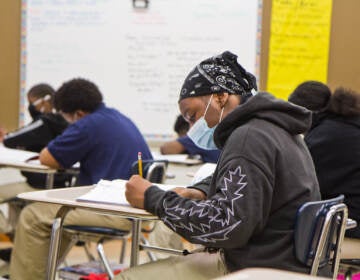LGBT-friendly high school among slate of Philly charter school hopefuls

Quincy Riley-Greene is hoping to create a charter school that improves the experience of LGBT students. (Kimberly Paynter/WHYY)
The Philadelphia School District, which will accept applications for new charter schools through Nov. 15, already has received 22 letters of intent.
One of them is from James Baldwin Charter High School – which would stress lesbian, gay, bisexual and trans-gender inclusion.
Named for the gay 20th century African-American author, Baldwin Charter would be built on anti-bullying principles in hopes of providing a safe atmosphere for all. It would also feature LGBT awareness in its curriculum.
Quincy Riley-Greene, founder of the LGBT youth group Q Spot, is making the pitch for the charter. He said he hears from students all the time who feel marginalized in school.
“They may hear words such as the ‘f-word,’ or ‘that’s so gay,’ or ‘being gay is wrong.’ Even though acceptance has increased, within the school environment, I think there’s still a disconnect,” said Riley-Greene. “Those policies may be on paper, but they’re not necessarily being enforced.”
A 2013 survey by the Gay, Lesbian and Straight Education Network found that more than half of LGBT youth nationwide felt unsafe at school based on their orientation.
Riley-Greene came up with the idea for a charter about a decade ago after learning about the Harvey Milk school in New York City. Resistance, though, came from leaders in the gay community who believed such a school could create more problems than it fixed.
“Some of them felt like by creating this type of model, in a sense it’s like segregation,” he said.
Now, he said, the community is more open, and he believes Baldwin charter would provide an example to the rest of the schools in the city.
“This is where all schools need to be. They all need to be safe. They all need to be bully-free. This model can do that and show other schools how,” said Riley-Greene.
The proposal from Baldwin High focuses on a vacant 30,000-square-foot building in Mantua. Backup options are also being explored.
The Philadelphia School District says it trains its staff to deal with harassment based on orientation and gender identification. It tracks incidents of bullying, but doesn’t keep statistics by type.
“This issue does come up, but is not one of the primary issues that drive bullying in schools,” said district spokesman Fernando Gallard.
Changes for the better
Advocates for the rights and safety of LGBT youth say the city’s public schools have come a long way in their sensitivity to the needs of the community.
“The schools, in some ways, have gotten better,” said Carrie Jacobs, executive director of The Attic, an LGBT youth group. “It used to be very, very, very, very bad; now it’s not as much.”
Still, Jacobs said, students in district and charter schools still feel threatened. “Some drop out of school,” she said. “Some stay and feel tortured on almost a daily basis”
The Attic runs some professional-development programming for district faculty, but Jacobs said that service has dwindled since the district’s draconian budget.
“They can no longer pay for the support that they need,” she said. “We really need to work with the schools and hold them accountable, make them more culturally inclusive.”
Jacobs was encouraged that the district recently reached out to her group to help it develop better policies and programming for transgender students.
“They’ve certainly made efforts. I’ve got to give kudos …” she said. “But this issue is so important, that they need to be doing more.”
Of the Baldwin High School proposal, Jacobs had a mixed opinion.
“I’m not against it …” she said. “But we always have to be careful of where we put our resources. I don’t think it solves everything.”
New applications
The school district began hearing applications for new independent charters last year after years of moratorium – when only neighborhood-based charters were granted through the renaissance initiative.
Leaders had said further expansion of independent charters would prove too costly to the district’s already weak bottom line. The floodgates opened when an amendment was added in Harrisburg to the Philadelphia cigarette tax bill.
The district received 40 applications last year. The School Reform Commission ultimately approved six, with restrictions. All approved came from operators with a track record in the city.
Riley-Greene himself is not an educator, and he does not plan to be an administrator at the school. The Baldwin proposal comes from a coalition that also includes a University of Pennsylvania professor, a clinical nurse at the Hospital of the University of Pennsylvania, a school nurse and a parent.
“We are very realistic about this process,” said Riley-Greene. “We know that there is a high chance that it won’t be approved this first time. And so we’re thinking, next year, that application will be as close to perfect as possible.”
Some of the schools rejected last year have again submitted letters of intent – including those operated by KIPP, String Theory and Esperanza. The Ligouri Academy also intends to reapply.
Newcomers include a pitch for Folk-Arts Cultural Treasures 2.0. FACTS charter was co-founded by Democratic City Council nominee Helen Gym. In February, Gym testified that further charter expansion would be “not only morally repugnant, but economically insane” due to the cost of new charters to the district.
Asked about the new pitch, Gym said that while she’s “not in favor of mass charter expansion,” she believes there should be “room to explore strategic expansion … for schools that look to meet students’ unique needs.”
Gym, personally, does not currently have a formal association with FACTS, but her husband sits on its board.
UPDATE: Gym wished to clarify her position on the prospect of charter expansion.
“I am against charter expansion period at this time. My top priority is to receive and review state funding and re-establish and prioritize attention on a restoration agenda in District-run public schools. Once that happens, we can talk about a strategic expansion of charters but not until then,” she wrote in a follow up correspondence.
WHYY is your source for fact-based, in-depth journalism and information. As a nonprofit organization, we rely on financial support from readers like you. Please give today.





